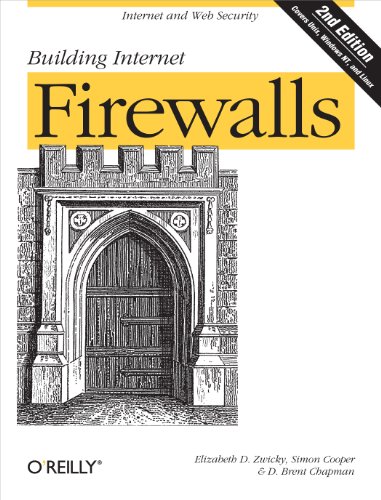
Building Internet Firewalls
Rate This Product :



In the five years since the first edition of this classic book was published, Internet use has exploded. The commercial world has rushed headlong into doing business on the Web, often without integrating sound security technologies and policies into their products and methods. The security risks--and the need to protect both business and personal data--have never been greater. We've updated Building Internet Firewalls to address these newer risks.What kinds of security threats does the Internet pose? Some, like password attacks and the exploiting of known security holes, have been around since the early days of networking. And others, like the distributed denial of service attacks that crippled Yahoo, E-Bay, and other major e-commerce sites in early 2000, are in current headlines.Firewalls, critical components of today's computer networks, effectively protect a system from most Internet security threats. They keep damage on one part of the network--such as eavesdropping, a worm program, or file damage--from spreading to the rest of the network. Without firewalls, network security problems can rage out of control, dragging more and more systems down.Like the bestselling and highly respected first edition, Building Internet Firewalls, 2nd Edition, is a practical and detailed step-by-step guide to designing and installing firewalls and configuring Internet services to work with a firewall. Much expanded to include Linux and Windows coverage, the second edition describes:Firewall technologies: packet filtering, proxying, network address translation, virtual private networksArchitectures such as screening routers, dual-homed hosts, screened hosts, screened subnets, perimeter networks, internal firewallsIssues involved in a variety of new Internet services and protocols through a firewallEmail and NewsWeb services and scripting languages (e.g., HTTP, Java, JavaScript, ActiveX, RealAudio, RealVideo)File transfer and sharing services such as NFS, SambaRemote access services such as Telnet, the BSD "r" commands, SSH, BackOrifice 2000Real-time conferencing services such as ICQ and talkNaming and directory services (e.g., DNS, NetBT, the Windows Browser)Authentication and auditing services (e.g., PAM, Kerberos, RADIUS);Administrative services (e.g., syslog, SNMP, SMS, RIP and other routing protocols, and ping and other network diagnostics)Intermediary protocols (e.g., RPC, SMB, CORBA, IIOP)Database protocols (e.g., ODBC, JDBC, and protocols for Oracle, Sybase, and Microsoft SQL Server)The book's complete list of resources includes the location of many publicly available firewall construction tools.

In the vast and varied universe of computer books, only a few stand out as the best in their subject areas. Building Internet Firewalls is one of those. It's deep, yet carefully focused, so that almost anything you might want to know about firewall strategies for protecting networks is here. In addition, there's lots of information on the reasons that we build firewalls in the first place, which is to say the security risks that come with Internet connectivity. You'll learn a great deal about Internet services and the protocols that provide them as you follow this book's recommendations for stifling attacks.
If there's a shortcoming to this book, it's its lack of coverage of the turnkey firewall products that are becoming popular among home and small-office users. Emphasis here is on more complicated network defenses that require careful design and setup--both design and implementation are the order of the day here. The authors carefully enumerate the threats they see in various situations, go into some detail on how those threats manifest themselves, and explain what configuration changes you can make to your perimeter defenses to repulse those threats. Plenty of illustrations make points about good and bad security strategies (you want to put the routers here and here, not here or here). You'll learn a lot by reading this book from cover to cover, no matter how much experience you have. --David Wall
Topics covered: Means of protecting private networks from external security threats. The authors go into detail on attackers' means of exploiting security holes in common Internet services, and show how to plug those holes or at least limit the damage that can be done through them. With coverage of Unix, Linux, and Windows NT, the authors detail their philosophies of firewall design and general security policy.

 *** Product Information and Prices Stored: Oct 28, 2011 18:31:10 ***
*** Product Information and Prices Stored: Oct 28, 2011 18:31:10 *** Please Check Update Here!!
Buy best ganesh Buy and sale bird cage Buy and sale tiffany necklace

























